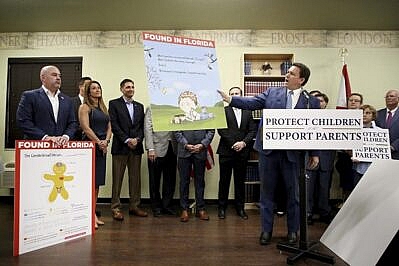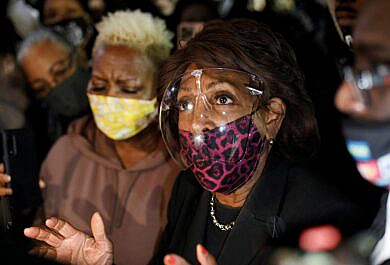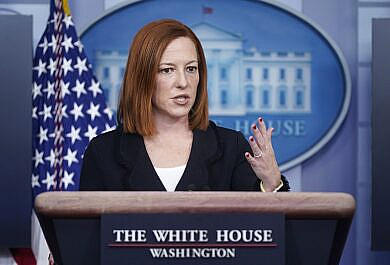Florida’s parental rights law – aka the “Don’t Say Gay” law – has kicked off a firestorm among left-leaning politicians, celebrities, media organizations, and parents. What’s the real story?
Summary
Florida’s new Parental Rights in Education law was championed by Gov. Ron DeSantis (R) and earned conservative praise. It also ignited a media firestorm and has been disparaged by the mainstream media, celebrities, and progressives as the “Don’t Say Gay” law.
What The Bill Says
House Bill (HB) 1557 – the Parental Rights in Education Bill – will take effect for the 2022-2023 school year.
- Requires school boards to adopt parental notification procedures if there is a change in the student’s services or monitoring related to their mental, emotional, or physical health or well-being
- Must reinforce the “fundamental right of parents to make decisions” regarding their children’s upbringing, schools should encourage students to discuss issues relating to their well-being with their parents or facilitate discussion
- Parents may not be prohibited from accessing any of their student’s education or health records
- Schools may not prohibit personnel from notifying parents about their student’s well-being or health or encourage students from withholding that information from their parents
- However, school personnel may “withhold such information from a parent if a reasonably prudent person would believe that disclosure would result in abuse, abandonment, or neglect.”
- Classroom instruction on sexual orientation or gender identity “may not occur in kindergarten through grade 3” or “in a manner that is not age-appropriate or developmentally appropriate for students in accordance with state standards”
- “Instruction on sexual orientation or gender identity” is left undefined
- “Age-appropriate” and “developmentally appropriate” are left undefined
- Parents may decline specific healthcare services at the beginning of each school year and parental permission is necessary for health screenings for students K-3
- Creates a process where parents can notify principals or staff members about concerns related to this law, and the school must resolve or respond within 7-30 days
- If the school does not “resolve the concern” a parent can:
- Request the state Commissioner of Education to appoint a special magistrate to investigate the dispute and recommend a resolution to submit to the State Board of Education, at the school district’s expense.
- Sue the school for injunctive relief, damages, and attorney fees
![]()
- The New York Times offered a critical close read of the Florida bill as part of its “Education briefing.”
- NPR interviewed Florida teachers concerned that the bill’s vague language will have a “chilling effect” in the classroom.
- CNN argued the “focus on ‘parental rights’ chips away at gay rights” and will damage LGBTQ students, parents, and teachers. These articles are a representative sample of the typical mainstream media perspective on this bill.
![]()
- Legal Insurrection defends the bill as not “anti-anyone” and a law that “sets limits” on what schools can do without parental consent. The author argues that DeSantis must “defeat” Disney, who “thinks it runs Florida, not Floridians.”
- The Dispatch Podcast interviewed Gabriel Malor and Eugene Volokh, two prominent conservative lawyers who disagree on Florida’s law. Their discussion addressed the benefits and drawbacks of the Florida parental rights law from a conservative perspective.
- The Wall Street Journal editorial board slammed the “overwrought” reaction to the bill and pointed out it’s unclear whether the bill would have an immediate affect as the K-3 instruction banned under the legislation is not currently taught in Florida schools.
Author’s Take
Two things can be true at the same time. The left-leaning media, celebrities, and Democrats have exaggerated the bill’s effects on LGBT rights and smeared it with the misleading “Don’t Say Gay” moniker that misstates the bill’s contents. The controversy over “Don’t Say Gay” may be one of the most misleading media narratives of recent years, right up there with the Hunter Biden laptop story or the Covington Catholic controversy.
However, the bill’s text is overly broad and quite vague. It leaves the “age and developmentally-appropriate” curriculum undefined, so while the bill ostensibly is about K-3 education, it’s not clear what kind of classroom instruction on sexual orientation and gender identity would be permissible for older students. Other critical provisions are similarly vague– instruction, types of parental concerns, defining whether those concerns have been “resolved,” and the line between where schools must disclose information to parents while at the same time being permitted to withhold information if a “reasonably prudent person” could think that could lead to adverse consequences for a child.
It’s not hard to imagine that line being quite different in the most socially conservative and socially liberal areas of the Sunshine State. What the bill does make clear is the many avenues for parents to sue their schools. Florida seems destined for dozens of lawsuits trying to figure out what the bill actually means, and some have already been filed.
States absolutely have the prerogative to set their own curriculums. Blue America’s narrative over this bill is misleading and inaccurate, although concerns over the bill’s sweeping yet vague language seem well-founded. Even so, the goals of Florida’s parental rights law – restoring parental rights in education, keeping inappropriate materials out of K-3 classrooms, giving parents avenues to redress grievances if the school stonewalls them –are popular in Florida across the political spectrum.
© Dominic Moore, 2022






